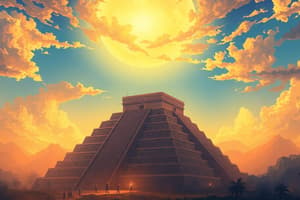Podcast
Questions and Answers
¿Cuál es el nombre del lugar que los aztecas llamaron Tenochtitlán?
¿Cuál es el nombre del lugar que los aztecas llamaron Tenochtitlán?
- México Ciudad (correct)
- Tula
- Chan Santa Cruz
- Aztlan
¿Cuál era el tipo de estructura social que tenían los aztecas?
¿Cuál era el tipo de estructura social que tenían los aztecas?
- Comunista
- Feudal
- Tribal
- Clsica con nobles, comunes y esclavos (correct)
¿Cuál es el nombre del dios principal de los aztecas?
¿Cuál es el nombre del dios principal de los aztecas?
- Huitzilopochtli (correct)
- Coatlicue
- Tlaloc
- Quetzalcoatl
¿Cuál es el nombre de la capital del imperio tolteca?
¿Cuál es el nombre de la capital del imperio tolteca?
Flashcards are hidden until you start studying
Study Notes
Pre-Columbian Civilizations in Mexico
Pre-Columbian civilizations in Mexico refer to the cultures that existed before the arrival of Christopher Columbus in the Americas. Although the impact of Columbus's arrival varied among different cultures and regions, it marked the beginning of European conquest and colonization, which led to a significant change in the continent's history. Two of the most notable pre-Columbian civilizations in Mexico are the Olmec and the Aztec.
Olmec Civilization
The Olmec civilization developed in the Central Valleys of Oaxaca and the current status of Veracruz and Tabasco around 1200 b.C. They were known for their polytheist religious beliefs, which included a great number of gods related to agriculture and natural elements like the sun, water, and volcanoes. Their great god was the jaguar, frequently represented in Olmec icons. The Olmec civilization was the first in Mesoamerica and had a dynastic hierarchy, with governors being descendants of the gods.
The Olmecs were influential in Mesoamerican culture, as they introduced various achievements such as the technique for working stone, observation of the stars, the ball game, and the invention of the zero. They are also believed to be the birthplace of writing and time calculations. The Olmec ceremonial centers were separate from the areas where people lived, and only the governors, priests, and their servants lived within the religious centers. The people gathered at the center only for religious and military celebrations.
Aztec Civilization
The Aztec civilization originated in the mythical Aztlan, from where they emigrated in search of the land promised to them by their main god, Huitzilopochtli. The signal for their destination was an eagle standing on a cactus and devouring a snake, which they called Tenochtitlán. This place is now Mexico City and the image is Mexico's coat of arms. The Aztecs worshiped many gods, including Huitzilopochtli, Quetzalcoatl, Tlaloc, and Coatlicue. They carried out human sacrifices as an offering to their gods and practiced rituals to produce rain.
The Aztecs had a complex social structure with three distinct classes: nobility, commoners, and slaves. The nobility owned the land and most of the wealth, while the commoners worked the land and provided labor for the nobility. Slaves were usually captured in wars and were used for various tasks.
The Spanish conquest of the Maya people was consummated in 1697, and the last Maya state disappeared in 1901 when Mexico occupied its Chan Santa Cruz, marking the end of the Caste War.
Toltec Civilization
The Toltec civilization had domain over the center part of Mexico from the X to the XII centuries. Around the year 1050, Tula (also known as Tollan Xicocotitlán) became the capital of the great Toltec Empire. This capital was located in the current Mexico Valley, near the northern border of Mesoamerica. The Toltecs were known for their advanced metalworking, pottery, and architecture.
In conclusion, pre-Columbian civilizations in Mexico were diverse and influential in shaping the cultural, religious, and social structures of Mesoamerica. The Olmec, Aztec, and Toltec civilizations, among others, contributed significantly to the development of Mesoamerican society and culture, which continue to influence Mexico today.
Studying That Suits You
Use AI to generate personalized quizzes and flashcards to suit your learning preferences.



